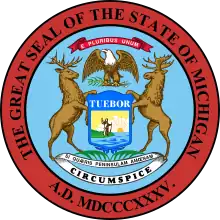George Coe (Michigan politician)
George Alonzo Coe (August 16, 1811 – October 21, 1869) was an American politician from the U.S. state of Michigan. He served as the 11th lieutenant governor of Michigan.
George Coe | |
|---|---|
| 11th Lieutenant Governor of Michigan | |
| In office 1855–1859 | |
| Governor | Kinsley S. Bingham |
| Preceded by | George Griswold |
| Succeeded by | Edmund Burke Fairfield |
| Member of the Michigan Senate from the 4th district 3rd District (1846) | |
| In office 1846–1847 | |
| Member of the Michigan House of Representatives from the Branch County district | |
| In office 1849–1849 | |
| Preceded by | Alvarado Brown and Benjamin F. Ferris |
| Succeeded by | Oliver D. Colvin and Roland Root |
| Personal details | |
| Born | August 16, 1811 Rush, New York |
| Died | October 21, 1869 (aged 58) Coldwater, Michigan |
| Resting place | Oak Grove Cemetery Coldwater, Michigan |
| Political party | Whig Republican Party |
Early life
Coe was born in Rush, New York and moved to Illinois at a young age. He was raised on his father's farm until the age of fourteen and then attended school and taught school.[1] He studied law with Judge Pratt in Rochester, New York and began the practice of law in Coldwater, Michigan in 1839. In 1856, Coe became a law partner with future Congressman Charles Upson.[2]
Political career
Coe held various political positions in Michigan, and was elected as a Whig candidate to the Michigan House of Representatives in 1840.[3] In 1846 he was elected to the Michigan Senate to represent the 4th District, and in 1847 he was elected to the State Senate to represent the 3rd District. Coe was elected as the first Republican to serve as the 11th Lieutenant Governor of Michigan. He served as Lieutenant Governor from 1855 to 1859 under Michigan Governor Kinsley Bingham.[4]
Coe was also a delegate to the 1856 Republican National Convention from Michigan, which nominated John C. Fremont for U. S. President, however Fremont lost to James Buchanan in the general election.[5] Coe left office in 1859 at the age of fifty-eight, and resumed his legal practice.
He died in Coldwater, Michigan on October 21, 1869, ten years after leaving office.[6] He is interred in Oak Grove Cemetery in Coldwater.
References
- the University of Michigan (1888). EARLY HISTORY WITH BIOGRAPHIES OF STATE OFFICERS. the University of Michigan. p. 181. Retrieved 13 June 2014.
- Hubbell, John T. and Geary, James W. (1995). Biographical Dictionary of the Union: Northern Leaders of the Civil War. Greenwood Publishing Group. p. 548. ISBN 9780313209208. Retrieved 13 June 2014.
{{cite book}}: CS1 maint: multiple names: authors list (link) - the University of Michigan (1888). EARLY HISTORY WITH BIOGRAPHIES OF STATE OFFICERS. the University of Michigan. p. 181. Retrieved 13 June 2014.
- Collin, Rev. Henry P. (1906). A TWENTIETH CENTURY History and Biographical Record OF BRANCH COUNTY, MICHIGAN. REV. HENRY P. COLLIN, M. A. p. 216. Retrieved 13 June 2014.
- Republican Party (Mich.) (1904). Proceedings at celebration of the fiftieth anniversary of the birth of the Republican party: at Jackson, Michigan, July 6, 1904. Republican Party (Mich.). p. 74. Retrieved 13 June 2014.
- The Society (1908). Historical Collections, Volume 14. The Society. Retrieved 13 June 2014.
Further reading
- Bingham, Stephen D. (2005) [1888]. "s.v. George Coe". Early history of Michigan, with biographies of state officers, members of Congress, judges and legislators. Pub. pursuant to act 59, 1887. Ann Arbor, Mich.: University of Michigan Library. p. 181. Retrieved 2007-07-26.
